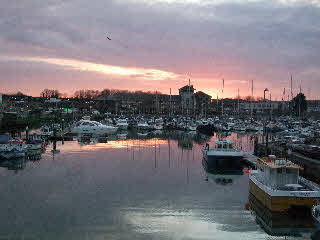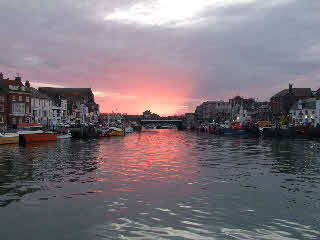Weymouth Harbour - A busy port Picture
Picture of - 'Weymouth Harbour - A busy port'

< < < -- Back to Discovering Weymouth Harbour -- < < <
Weymouth harbour has for centuries been a busy, bustling harbour, from a busy trading port of centuries gone by to the fishing, tourist and pleasure harbour of today. The Weymouth picture here shows Weymouth harbour from the pleasure pier looking out towards the Nothe Fort with a tall ship coming into the safe waters of Weymouth harbour.
Weymouth Harbour and the Nothe Fort museum of military history
In the above Weymouth picture we can see the imposing Nothe Fort sitting on the edge of Weymouth harbour with its guns pointing from the ramparts - the Weymouth harbour ferry provides a short row boat ride from one side of the harbour to the other at the ferry steps on either side of Weymouth old harbour. The Nothe Fort tells Weymouth military history through the centuries, all is told from the Roman invasion to the World War 2 torpedoes and the cold war. All brought to life through life size displays, working models, videos and sound. A full day out in Weymouth can definately be enjoyed at the Nothe Fort and a visit is well worth it.The Romans in Weymouth and Dorchester
Weymouth history has a rich and varied military past, the Roman invasion saw Roman galleys sailing up the River Wey (Weymouth harbour) to land supplies at Radipole, ready to send on to the Roman settlement at Dorchester (or Durnovaria as the Romans called it). The Maumbury Rings at Dorchester is an ancient Neolithic structure, standing at least some 2500 years before the Romans landed, it was adapted by the Romans as an amphitheatre and reminds us of the Roman settlement at Dorchester, as does the Roman villa, while the nearby Maiden Castle, an Iron Age hillfort was abandoned during the Roman settlement.The Crabchurch conspiracy, HMS Hood and Dunkirk
Weymouth harbour played an important role in the Crabchurch conspiracy - one of the most famous battles in Dorset Civil war history. HMS Hood was scuttled at the entrance to Portland Harbour to defend Portland Harbour in World War 1 from German U-boats - the shadow of HMS Hood in Portland harbour can still be seen to this day, across the entrance. Many small boats sailed from Weymouth harbour in the Dunkirk evacuation and again in the D-Day landings. Areas of Weymouth were heavily bombed by the Luftwafe during World War 2 while the Nothe Fort had its own nuclear shelter during the cold war. Clearly the military has had a big role in Weymouth history.Dorset Castles to visit or see(not all are accessible)
Other fortifications and castles to visit in Dorset (around Weymouth) include the ruined and ancient Sandsfoot castle - a small ruined castle standing on the Weymouth side of Portland harbour, Henry VIIIs Portland castle - an English Heritage site (open to the public for a small fee), the breakwater fort on the Portland harbour breakwater - not accessible but it can be seen from Newtons Cove and the remains of Rufus castle/Bow and Arrow castle sitting high above St Andrews churchyard at Church Ope Cove - while Rufus castle is out of bounds, it can be seen from St Andrews churchyard which is accessible from steps at Church Ope Cove and includes the famous 'Portland Pirate grave'. Further out but only a short drive away are the ruins and much recognised Corfe Castle - held by the Royalists in the civil war until its eventual capture, the defence of Corfe Castle against the parliamentarian siege was led by its owner Mary Bankes and the original keys to Corfe castle can still be seen at the Bankes' family seat, Kingston Lacy in nearby Wimborne Minster, now another National Trust site.Places near Weymouth to visit.....
One of the most beautiful UK ghost villages is located in Dorset, set in the beautiful Tyneham valley - Tyneham village has been left to be reclaimed by nature with crumbling ruins of the quaint cottages that once made up the street. Tyneham school and Tyneham church have been restored. Tyneham village opening times vary throughout the year, being open most weekends and holidays, its always best to check that the Lulworth range walks and the beautiful Tyneham valley is open before visiting.View more things to do in Weymouth
Visit the Nothe Fort
The Nothe Fort is a victorian fort now a museum of life in Weymouth during world war II.
The Nothe Fort is a victorian fort now a museum of life in Weymouth during world war II.
Pirate Graves Church Ope Cove
The Pirates Graveyard at Church Ope Cove on Portland is found high above Church Ope Cove.
The Pirates Graveyard at Church Ope Cove on Portland is found high above Church Ope Cove.
Tyneham Ghost village
Tyneham Ghost Village is a deserted village.
Tyneham Ghost Village is a deserted village.
Things to do in Weymouth in the rain
There are plenty of things to do in Weymouth when it rains and lots more things to do around Dorset too.
There are plenty of things to do in Weymouth when it rains and lots more things to do around Dorset too.
Weymouth History
Did you know that the Black Death arrived in England in 1348 through the port of Weymouth.
Did you know that the Black Death arrived in England in 1348 through the port of Weymouth.
Portland Harbour, Breakwaters and HMS Hood
Portland Harbour History, the Portland Breakwaters, the sinking of HMS Hood and Portland at war.
Portland Harbour History, the Portland Breakwaters, the sinking of HMS Hood and Portland at war.
Just Weymouth - Disclaimer

